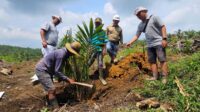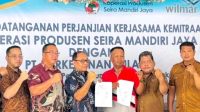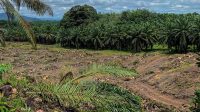PALMOILMAGAZINE, JAKARTA – Leading partnerships at Sinar Mas Agribusiness and Food was never part of Alwi Hafiz’s career blueprint. Yet when the opportunity came, it became a turning point. “I was surprised when I got the role—surprised in a good way. It turned out to be one of the most meaningful chapters of my journey,” he shared.
In the world of global agribusiness, sustainability partnerships are often seen as paperwork, agreements, and compliance reports. But for Alwi, the role is deeply personal—about building trust, finding common ground, and turning shared visions into tangible impact for people and the planet.
From peatland restoration with PepsiCo and Nestlé to supporting farmers’ livelihoods and improving childcare facilities in rural areas, Alwi believes partnerships go far beyond business. “It’s not just about KPIs. It’s about aligning missions and making sure the impact is felt where it matters—on the ground,” he told beige-heron-208544.hostingersite.com, quoting Sinar Mas (Thursday, Aug 28, 2025).
Also Read: Stronger Smallholder Productivity: PalmCo Aims for 22,000 Hectares Replanted in 2025
Collaboration for Shared Impact
Behind each initiative lies the company’s Collective for Impact framework—an approach that emphasizes working with partners who bring not only funding, but also fresh ideas and perspectives.
“The best partnerships happen when both sides care about the same outcomes,” Alwi explained. He recalled how one partner suggested including women’s participation indicators in a program. Initially, it wasn’t part of the plan, but it later became a key measure of success.
From Peatlands to Palm Plantations
Several projects now stand as proof on the ground. In West Kalimantan, the company and Nestlé are continuing a 2,600-hectare peatland restoration project first initiated with L’Oréal—combining ecological recovery, sustainable water management, and livelihood diversification.
In North Sumatra, the Sawit Terampil program with IDH has trained more than 3,000 independent palm smallholders and mapped over 3,000 hectares of farmland. Over 500 farmers are now on track toward RSPO and ISPO certification, supported by global partners including Mars, Mondelez, Fuji Oil, and Neste.
Meanwhile in Riau, the Childcare Center (BPA) initiative supported by ADM Cares and Tzu Chi has improved facilities, trained caregivers, and encouraged the active involvement of Dharma Wanita in community activities.
To date, nearly 20 partnership programs have been implemented—some completed, others ongoing. For Alwi, success is not measured only in financial investment, but also in shared ideas, vision, and above all, trust. “Many partners return for one simple reason: we keep our promises,” he said.
Regular field visits strengthen these bonds, allowing communities and partners alike to see the real impact. The partnerships are collaborative, not transactional. “We listen, adapt, and grow together. That’s why partners continue choosing to go further with us,” Alwi concluded. (P2)





































